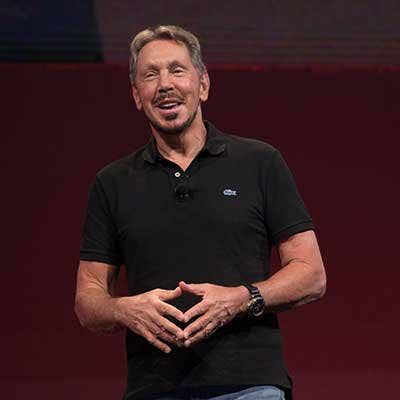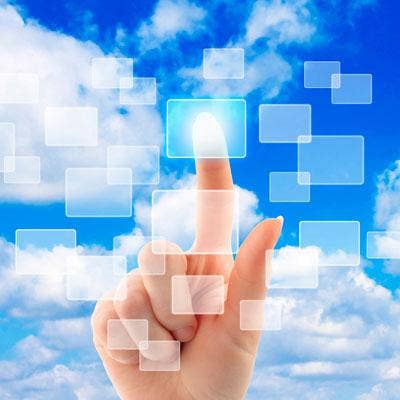Ellison Opens Oracle OpenWorld With Oracle Database 18c Debut

Ellison Introduces Oracle's Next-Gen Database
Oracle founder, CTO, executive chairman and evangelist extraordinaire Larry Ellison welcomed customers and partners to the Oracle OpenWorld 2017 conference Sunday with a new release of the company's flagship database software.
But Oracle 18c isn't just any database. It's "the only self-administering database in the entire world," Ellison told attendees of his company's annual conference in San Francisco.
In expounding on 18c's breakthrough features and cost benefits, Ellison took every chance he could to say an unkind word about public cloud leader Amazon Web Services, his favorite target of late.
Here are some of Ellison's descriptions of advances Oracle has made in its database technology, and all the corresponding digs against AWS.
Oracle Database 18c will be available to customers in December, but, as Ellison said, only if they're "willing to pay much less."
Fully Autonomous Administration
You've heard of self-driving cars. Oracle 18c is a self-driving database, the world's first, according to Ellison.
That means the new database dynamically provisions itself, patches itself, updates itself, and tunes itself, all without human intervention.
"Where there's no human administration, there's no human error. And there's no opportunity for human malicious behavior."
It's also "truly elastic," unlike the AWS Elastic Compute Cloud, Ellison said.
The system adds resources when needed and takes them back when not in use. Amazon, on the other hand, requires human provisioning and users pay for resources dedicated to their database, whether they use them or not, the Oracle CTO said.
With 18c, "you don’t allocate compute, you don’t allocate storage, until you're actually going to use it," he said.

Highly Automated Security
Much of the same technology that makes 18c run autonomously is also employed to enforce security.
Ellison will talk more about automated cybersecurity in a keynote on Tuesday, but he previewed some of the defense measures of 18c on Sunday.
While the security features are still not entirely automatic, they introduce a new level of automated response to defend data, including alerting administrators during the "reconnaissance phase of an attack, when someone's nosing around in your computer systems," Ellison said.
The system not only detects threats, but can take actions to remediate them, including patching software while still running. The worst data intrusions in history have occurred after a patch was available to stop them.
"The safest place to store your data is in an Oracle database, particularly an autonomous database," Oracle's CTO said.
"We do everything that we can to avoid human intervention. It's our computers verses their computers in cyberwarfare."

Machine Learning
The fully automated administrative and partially automated security capabilities were achieved using the same technology, one that is "every bit as revolutionary as the Internet itself," Ellison said.
Machine learning is finally realizing the long-awaited promise of artificial intelligence, he said. It's the "first branch of artificial intelligence that really works."
You can recognize a "dramatic and revolutionary new technology," Ellison said, "simply by the charisma of the applications they enable."
Machine learning is enabling self-driving cars and computer vision. And now it's being put to work to advance the database.
The ability to train software to discern between normal and abnormal usage patterns turns the abundant event logs generated by IT systems into valuable resources for improving database functionality and protecting data sets, Ellison told OpenWorld attendees.

Availability
Read the fine print on a service level agreement from just about any cloud services provider and all the performance "nines" that are promised probably will turn out not to be as they first appeared, according to Ellison.
Those uptime guarantees often are so riddled with exceptions that they're functionally meaningless.
To make that point, Ellison showed the clause in Amazon's SLA that stipulates events for which Amazon is not penalized. Among the scenarios are AWS scheduled downtime, resource provisioning time and software bugs.
Oracle 18c comes with a 99.995 availability guarantee, and it means just that. The system will not be down for more than 30 minutes a year, and that includes scheduled maintenance, Ellison said.
"Amazon has all of these exceptions to their availability guarantee. We have no exceptions to our availability guarantee," he told attendees.
Oracle can make such a pledge of non-stop availability because it is highly fault tolerant, capable of node recovery and software upgrades while running.
"There aren't a lot of databases that have this technology. Certainly not the databases at Amazon."

Cost
Oracle will write into its 18c contracts a guarantee to bill at least 50 percent less than what AWS would for the same database workload.
To customers who move workloads to Oracle's autonomous database from Amazon, "we guarantee contractually your bill will be half or less what Amazon charges you," Ellison pledged to rousing applause from his partners and customers.
Oracle Database 18c actually prices its services at roughly the same rate as AWS products. But it runs database functions so much faster, the actual cost is "a fraction of what Redshift costs at Amazon, or a fraction of what other databases cost at other clouds," Ellison said, referring to the AWS data warehouse service.
Customers also save money with its dynamic provisioning of resources at "the moment they're needed, but not a moment sooner," Ellison said. "So you'll only pay for what you use."
That doesn't even get into labor costs, which the automated capabilities drastically reduce, he said.

Rollout
While 18c gets its moniker from the year 2018, the first version, meant for data warehousing applications, will roll out this coming December.
Another production version geared for online transaction processing will be introduced in June of 2018.
And because the 18c edition runs on Exadata infrastructure, it's available for on-premise deployments, as a public cloud service, or through Oracle's Cloud at Customer option.
A week ago, Oracle introduced a bring-your-own-license option for Platform-as-a-Service products. Customers can use that option to transfer costs from the purchase of an 18c database license to the comparable cloud services, Ellison said.